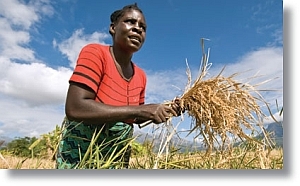Biotechnology is Good for Africa

 |
| Farmers are embracing biotechnology Photo courtesy |
There's no way of knowing for sure how many folks tuned in but some estimates put the television audience for the championship match at more than 1 billion.So it's no exaggeration to say that South Africa is truly on the global stage.
I think we've proven that South Africa can shine. As the tournament kicked off, tourists poured in. Along with huge numbers of television viewers, they've not only cheered goals and saves but they've also learned about my country, its history, and its inhabitants.
Most of these guests and onlookers have come away with a positive impression. South Africa is a beautiful country. It's full of friendly people. Although we have our problems, we also have a lot to offer.
In one area, we are an undisputed leader: agricultural biotechnology. Farmers in South Africa have embraced GM crops. Last year, we planted more than 5 million acres of genetically enhanced corn, soybeans, and cotton. The International Service for the Acquisition of Agri-Biotech Applications (ISAAA) lists South Africa as one of 15 "biotech mega-countries." Among other African nations, only Burkina Faso shares this distinction.
My personal experience is typical. I harvest corn and soybeans on about 2,400 acres (1000 ha) in the northeastern part of South Africa, near the town of Middleburg in the province of Mpumalanga--a Zulu name that means "place of the rising sun." Mpumalanga is the home of Kruger National Park, one of the largest game reserves in the world.
I began to research biotech crops more than two decades ago, planting strip trials for seed companies. At first, these early versions of GM corn didn't outperform conventional varieties. Yet they were easier to manage, so I started working with them. In recent years, there's been a remarkable turnaround. The yields of GM crops have beaten non-GM plants by substantial margins.
Over the last decade, my food production has doubled. We owe this to biotechnology ----- today all of my soybeans are GM and most of the corn I plant ----- and other technology innovations. I have access to the latest equipment technology and use precision farming tools such as combine yield monitors and differential fertilizer applicators that allow me to apply the appropriate fertilizer exactly where it is needed.
Many of my immediate neighbors have enjoyed similar levels of success. We're hoping to make even greater strides in the future, especially if drought-tolerant crops become available.
Unfortunately, a larger group of other neighbors--the farmers in nearby African countries--have not reaped the benefits of biotechnology. Although the experience of South Africa shows how much can be gained from using agriculture's latest tools, their governments have resisted GM crops.
Part of this reluctance owes to a simple lack of understanding. But they've also come under pressure from European governments that provide foreign aid and export markets. The EU has remained irrationally hostile to GM crops--and its hostility has blocked agricultural progress in Africa.
This is tragic. All around the world, farmers are learning how to grow more food for more people with biotechnology and other 21st-century tools. Africa, however, is different: It's the only continent where food production is in actual decline.
Things don't have to be this way. The example of South Africa proves that my fellow Africans shouldn't suffer the curse of food insecurity. By taking advantage of biotechnology and other new approaches to agriculture, farmers in my country are growing a lot more food than we did just a few years ago.
Other farmers should have the same opportunity. This is the way forward for Africa and its people. There was a time, not so long ago, when South Africa received a lot of unwelcome attention. My country was treated as an international pariah. Yet much has changed, as our hosting of the World Cup demonstrates. Today, in the areas of agriculture and biotechnology, we can be a model for Africa and the rest of the world.
By Michael Allen
Michael farms with his son in the North Eastern Part of South Africa in the Province of Mpumalanga and is a member of the Truth About Trade & Technology Global Farmer Network.
